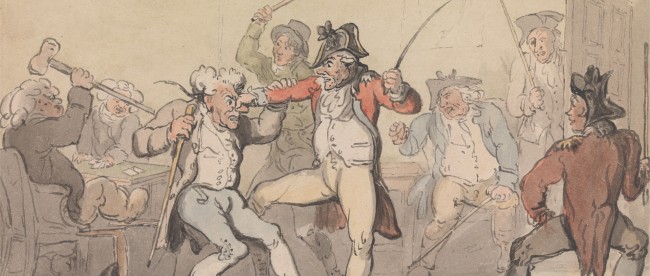The Duel That Kind of Wasn’t

On July 11, 1804, the Vice President of the United States, Aaron Burr, shot Alexander Hamilton in a duel in Weehawken, New Jersey. Hamilton died the next day. Burr, though, was never tried for his fellow stateman’s death; instead, he finished his term as Vice President without much in the way of further scandal — at least not relative to killing someone. Dueling, while hardly a nice way to solve a problem, wasn’t seen as the barbaric act as it is today. It’s probably too far afield to call it civilized, but it wasn’t chaos, either; dueling was governed by a loosely-defined set of rules and guidelines which were generally applied without question.
But what happens when someone breaks those rules? Well, things get a bit weird.
By 1826, dueling was illegal in Virginia, but let’s put that aside because the people involved in the kerfuffle we’re about to discuss also put that aside — as did the authorities at the time.
Henry Clay, the Secretary of State at the time, had a political enemy in the Senate named John Randolph. Randolph, hailing from Clay’s birth state of Virginia, had a reputation for speaking with a sharp tongue on the Senate floor. And one day, Clay caught the ire of one of Randolph’s asides. Per WETA, DC’s public media organization, Randolph called Clay a “puritan with the blackleg,” the latter term either meaning “a particularly nasty and often fatal disease that affects livestock” (per WETA) or a person who cheats at cards. Either way, the slur upset Clay.
His honor bruised, Clay demanded satisfaction — so he challenged Randolph to a duel. Randolph agreed, and the two were to draw weapons shortly thereafter. But according to the Senate rules, they shouldn’t have.
The Senate had previously decided that the open debate of the issues at the day required protection — even if the speeches took aim at their colleagues in Washington. The short version: if someone called you a nasty name during a Senate address, too bad so sad, you couldn’t challenge him to a duel. You just had to let it go. (This may have been a riff off the thinking of the Founding Fathers, who put a similar protection — although not one about dueling — in the Constitution itself.)
So, Clay should have never challenged Randolph to a duel, and in any event, Randolph should have said Clay had no such right. But Clay believed his adversary had waived that right and, for reasons unclear, Randolph was totally okay with that.
Thankfully, he wasn’t okay with killing Clay, though. And Clay probably wasn’t all that interested in killing Randolph, either. So the two men took to arms, neither wanting to shoot the other. That makes for an odd duel, and one would have hoped that the pair would come to their senses, but no such luck. On April 8, 1826, the two took aim at each other — kind of — in front of witnesses. Randolph had told a confidant that he intended to miss — “I shall do nothing to disturb the sleep of the child or the repose of the mother,” he said — and that he expected Clay to similarly not try to kill him. Randolph proved right. Clay shot and missed, Randolph returned the favor with an intentionally poorly-aimed shot of his own, and Clay kept the comedy of errant bullets going, shooting and missing again. For his second shot, Randolph fired into the air, showing his disinterest in going further with the charade.
As noted by the historical marker summarizing the day’s events, the duel ended peacefully thereafter — “the unhurt adversaries met each other halfway and shook hands.”
Bonus fact: As statesmen go, Henry Clay was prolific — he was a Senator (four separate times), the Speaker of the House (three separate times), the Secretary of State (only once), and a failed Presidential candidate (and he’d rather not talk about it). And he got an early start — too early, in fact. In 1806, the Kentucky legislature (as was the norm at the time) selected Clay to fill its vacant Senate seat; Clay was sworn in on December 26th of that year, about four months shy of his 30th birthday. That’s not allowed under the Constitution; Article 1, Section 3 Clause 3 specifically states that “No Person shall be a Senator who shall not have attained to the Age of thirty Years,” which Clay hadn’t. How’d he get away with it? Wikipedia offers a simple suggestion: none of the other Senators seemed to notice, and Clay probably wasn’t aware of the requirement or thought that it somehow didn’t apply.
From the Archives: Dueling Shields: Abraham Lincoln had a stupid duel, too.
Related: “Henry Clay: The Essential American” by David S. Heidler and Jeanne T. Heidler. 103 reviews; 4.3 stars on average.
